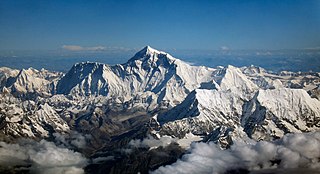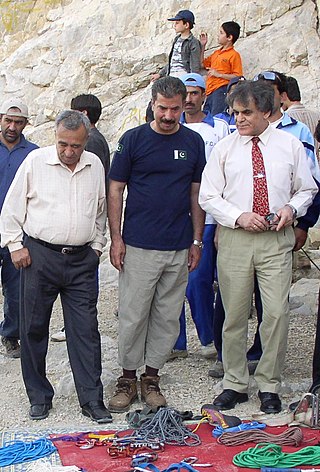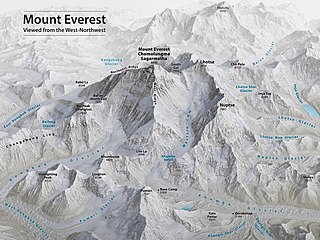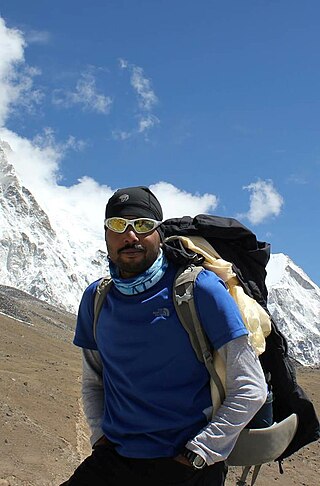
Mount Everest is Earth's highest mountain above sea level, located in the Mahalangur Himal sub-range of the Himalayas. The China–Nepal border runs across its summit point. Its elevation of 8,848.86 m was most recently established in 2020 by the Chinese and Nepali authorities.

Lhotse is the fourth-highest mountain on Earth, after Mount Everest, K2, and Kangchenjunga. At an elevation of 8,516 metres (27,940 ft) above sea level, the main summit is on the border between Tibet Autonomous Region of China and the Khumbu region of Nepal.

Dhaulagiri, located in Nepal, is the seventh highest mountain in the world at 8,167 metres (26,795 ft) above sea level, and the highest mountain within the borders of a single country. It was first climbed on 13 May 1960 by a Swiss-Austrian-Nepali expedition. Annapurna I is 34 km (21 mi) east of Dhaulagiri. The Kali Gandaki River flows between the two in the Kaligandaki Gorge, said to be the world's deepest. The town of Pokhara is south of the Annapurnas, an important regional center and the gateway for climbers and trekkers visiting both ranges as well as a tourist destination in its own right.

Nazir Sabir is a Pakistani mountaineer. He was born in Hunza. He has climbed Mount Everest and four of the five 8000 m peaks in Pakistan, including the world's second highest mountain K2 in 1981, Gasherbrum II 8035m, Broad Peak 8050m in 1982, and Gasherbrum I 8068m in 1992. He became the first from Pakistan to have climbed Everest on 17 May 2000 as a team member on the Mountain Madness Everest Expedition led by Christine Boskoff from the United States that also included famed Everest climber Peter Habeler of Austria and eight Canadians.

The North Col refers to the sharp-edged pass carved by glaciers in the ridge connecting Mount Everest and Changtse in Tibet. It forms the head of the East Rongbuk Glacier.
Tim Macartney-Snape is an Australian mountaineer and author. On 3 October 1984 Macartney-Snape and Greg Mortimer were the first Australians to reach the summit of Mount Everest. They reached the summit, climbing without supplementary oxygen, via a new route on the North Face. In 1990, Macartney-Snape became the first person to walk and climb from sea level to the top of Mount Everest. Macartney-Snape is also the co-founder of the Sea to Summit range of outdoor and adventure gear and accessories, a guide for adventure travel company World Expeditions and a founding director and patron of the World Transformation Movement.

The Kangshung Face or East Face is the eastern-facing side of Mount Everest, one of the Tibetan sides of the mountain. It is 3,350 metres (11,000 ft) from its base on the Kangshung Glacier to the summit. It is a broad face, topped on the right by the upper Northeast Ridge, and on the left by the Southeast Ridge and the South Col. Most of the upper part of the face is composed of hanging glaciers, while the lower part consists of steep rock buttresses with couloirs between them. The steep southern third of the Kangshung Face also comprises the Northeastern Face of Lhotse; this section may be considered a separate face altogether following the division of the South "Neverest" Buttress up to the South Col. It is considered a dangerous route of ascent, compared to the standard North Col and South Col routes, and it is the most remote face of the mountain, with a longer approach.

Mount Everest is the world's highest mountain, with a peak at 8,849 metres (29,031.7 ft) above sea level. It is situated in the Himalayan range of Solukhumbu district, Nepal.
Barry Chapman Bishop was an American mountaineer, scientist, photographer and scholar. With teammates Jim Whittaker, Lute Jerstad, Willi Unsoeld and Tom Hornbein, he was a member of the American Mount Everest Expedition led by Norman Dyhrenfurth, the first American team to summit Mount Everest on May 22, 1963. He reached the summit of Mount Everest by the South Col route on May 22, 1963 with fellow American Lute Jerstad, sharing the honor of becoming the second and third Americans to stand on Everest's summit. Prior to his Everest summit, Bishop participated in several other notable first ascents; the West Butress route on Denali in 1951, and the South West ridge route on 6,170 meter Himalayan peak Ama Dablam in 1961. He worked for the National Geographic Society for most of his life, beginning as a picture editor in 1959 and serving as a photographer, writer, and scientist with the society until his retirement in 1994. He was killed in an automobile accident near Pocatello, Idaho later that year.

The Hornbein Couloir is a narrow and steep couloir high to the west on the north face of Mount Everest in Tibet, that extends from about 8,000 to 8,500 m elevation, 350 metres below the summit.
Phu Dorjee was a Sherpa and the first Indian to summit Mount Everest without supplemental oxygen. He did so on May 5, 1984 on a solo ascent from the South East Ridge. Dorjee died in 1987 on the Kanchanjunga Expedition of the Assam Rifles.

The Lho La(Chinese: 洛拉山坳) is a col on the border between Nepal and Tibet north of the Western Cwm, near Mount Everest. It is at the lowest point of the West Ridge of the mountain at a height of 6,006 metres (19,705 ft). It is not exactly a Pass, but a part of Mt. Everest Range

The 1975 British Mount Everest Southwest Face expedition was the first to successfully climb Mount Everest by ascending one of its faces. In the post-monsoon season Chris Bonington led the expedition that used rock climbing techniques to put fixed ropes up the face from the Western Cwm to just below the South Summit. A key aspect of the success of the climb was the scaling of the cliffs of the Rock Band at about 8,200 metres (27,000 ft) by Nick Estcourt and Tut Braithwaite.
After World War II, with Tibet closing its borders and Nepal becoming considerably more open, Mount Everest reconnaissance from Nepal became possible for the first time culminating in the successful ascent of 1953. In 1950 there was a highly informal trek to what was to become Everest Base Camp and photographs were taken of a possible route ahead. Next year the 1951 British Mount Everest reconnaissance expedition reconnoitred various possible routes to Mount Everest from the south and the only one they considered feasible was the one via the Khumbu Icefall, Western Cwm and South Col. In 1952, while the Swiss were making an attempt on the summit that nearly succeeded; the 1952 British Cho Oyu expedition practised high-altitude Himalayan techniques on Cho Oyu, nearby to the west.
The 1951 British Mount Everest reconnaissance expedition ran between 27 August 1951 and 21 November 1951 with Eric Shipton as leader.

Unnikannan is the first Keralite to successfully climb Mount Everest twice. He is a native of Azhuthan Poyil Veetil from Peringome, a village near to Payyannur in Kannur district of Kerala State, India
Suresh Kumar was an Indian mountaineer. He was a member of two Indian Expeditions that conquered Mount Everest in 1992 and 1996. He is a native of Pattoli market Muthukulam, in Alappuzha district of Kerala State, India













